By: Trudy Horsting
The Beginnings:
Like many of us, Michael Lentz started in the marching arts in high school marching band. However, his path to becoming a band member was unique. One day, while avoiding a physical altercation with some schoolmates, Michael wandered the school hallways and happened across a flyer looking for marching band managers. He says, “That was the day my life changed forever.”
The title “manager” was a fancy way to say he was in charge of loading and unloading equipment, Michael explains. But while conducting his mundane tasks, he witnessed the passion of the members of the band and the sincerity with which they operated. He says, “Everyone was on the same team, and each person was fiercely loyal. Seeing that sparked a passion in me and is the reason I’m still involved nearly 42 years later.”
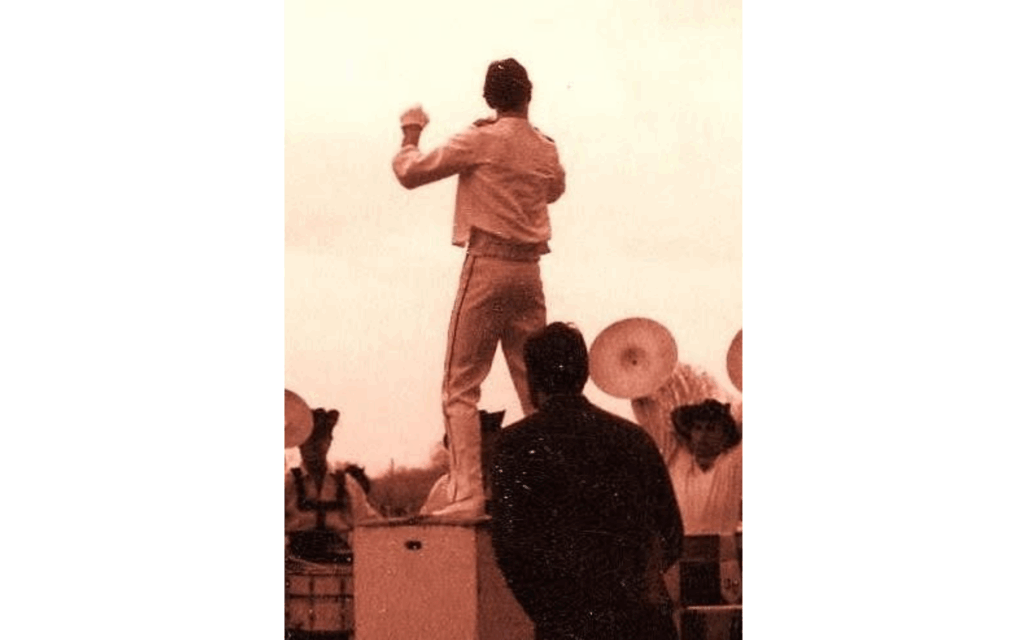
Michael decided to learn how to play the baritone and became more involved that same year. He took private lessons over the summer, and by the fall of his sophomore year, he was performing on the field. As a junior and a senior, he served as the drum major.
It was high school band that inspired him to keep exploring the marching arts. In the band room, the director always had DCI (early 80s) videos playing in the background. Michael says, “My assistant band director, his wife, and daughter invited me to attend a DCI show with them. To be honest, I was so hooked on my HS band that I wasn’t all that interested. However, once the first corps performed, I was blown away, and my world just doubled in size. From then on, every DCI show within 8 hours of Eastern Ohio had me in the stands.”

Impressively, Michael taught himself how to spin. He explains, “Growing up, there were never males in guard in our part of the country.” His sister was in the high school color guard, and he would spin her flag for fun, eventually picking things up. He remembers that just before high school graduation, the band director walked in on him spinning and was surprised at how good he was. After that, he never put down his flag. Now, he mentors others in the activity who started similarly to him. He says, “I recently started a mentorship program and selected four individuals from 60 applicants. The program is in its infancy, and there are numerous opportunities for the program to grow. I’m excited to help the people I mentor connect with others and become mentors themselves.”
After high school, Michael marched with the Bluecoats in 1989, playing baritone. He also marched with the Steel City Ambassadors Sr. Corps Color Guard in 1991. Michael went on to instruct, choreograph, design, direct, and judge color guard, as well as serving in various administrative roles for the marching arts. In 2007, Michael was one of a handful of directors who helped start the Ohio Indoor Performance Association (OIPA), where he served as Circuit President from 2007 to 2009. He has also served as a member of the WGI Color Guard Advisory board since 2001, for 5 years on the WGI Board of Directors, and a 1-year term on the WGI Steering Committee. Now, he is a well-deserving member of the WGI Hall of Fame.
Becoming a Judge
During high school, Michael always worked as a judge runner when the band hosted an invitational. He says, “I would hang on their every word and try to reconcile what I was watching and what the judge was saying.” Two years after he graduated, he was asked to judge auxiliary. It wasn’t until he sat down in the stands on competition day that he realized there were three score sheets, one for rifles, one for flags, and one for twirlers, and he was left on his own to figure out how to fill them out. Since that time, he learned that the judging craft is much more than just showing up, giving scores, socializing, and getting paid.”
Michael would go on to judge many groups and work with many “superstar” judges over the following years. He says, “I call them superstars not because of their name or which activities or seasons they judge, but because they make me a better judge and a better person. They have so many pressures placed upon them, and they care as much as a person can care. They also remain as open to growth as the students and instructors they judge.”
Michael explains judging as a magical experience. At times, judging has brought him to tears. Watching students experience success is just a beautiful thing. He recalls one of these moments earlier this year while judging his local circuit. He explains, “This group was filled with passion, and my eyes filled with tears. When they finished performing, I turned to the judge sitting next to me, and I saw that they were crying too. Experiences shared between performers and judges in the moments of performance are magical.”
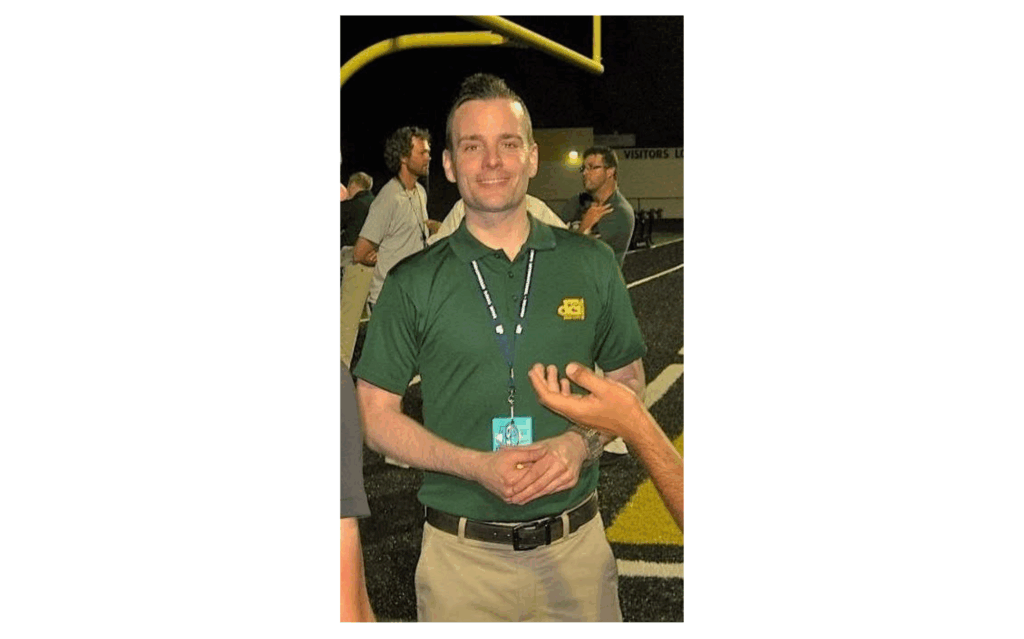
Judging can also be challenging and comical. Michael says, “The first time I ever judged on the field for DCI, a snare drummer grabbed my belt and pulled me back without warning. He saved me from what could have been a dangerous drill situation.” In another competition, Michael wasn’t as lucky. “On the field one October night, I thought it was the end of the show, but suddenly the entire color guard started running toward the front for an equipment change behind the props. I locked eyes with a guard member who was coming my way with both arms up at 45-degree angles and a flag in each hand. At that moment, we both knew how things were going to end. We collided with even more force than I expected. I was flat on my back, and we were tangled up in flags, costumes, and props. Without missing a beat, this performer crawled over my torso and said, ‘Sorry, mister’ as they trampled me one more time to run back onto the field.”
The Birth of Onyx
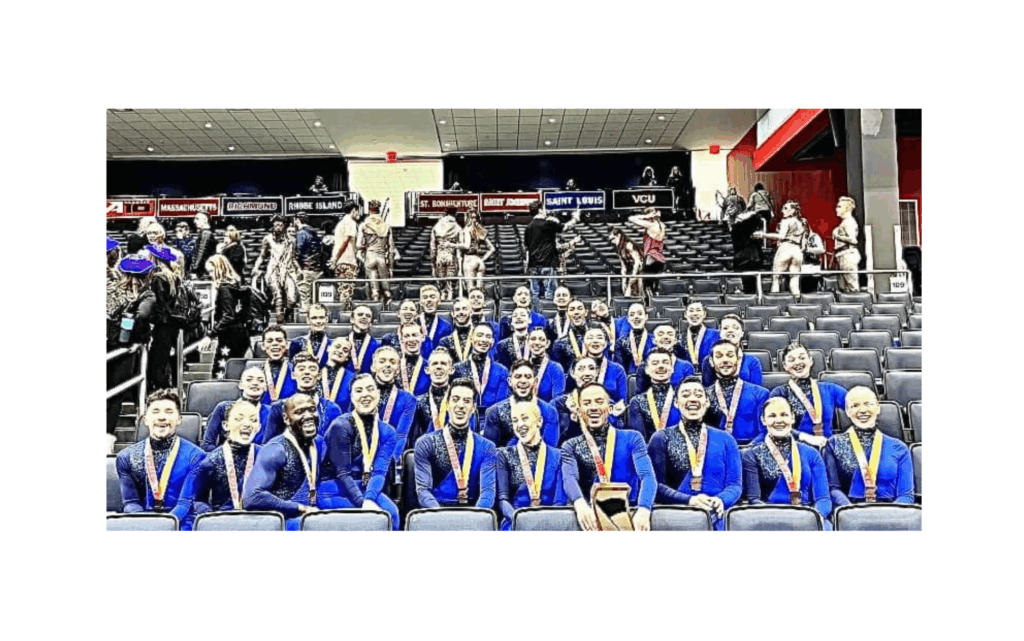
After high school, Michael didn’t take a break from the performing arts for even a minute. “Immediately out of high school, I began teaching marching band in NE Ohio. At the same time, I started college at West Liberty University in West Virginia.” However, taking classes all day, performing in the West Liberty Marching band playing baritone, driving 3 hours round trip to teach band every night, and of course, the time spent at performances, was burning Michael out.
When not in class or teaching, he was in the university library watching DCI Videos. He says, “My professors were very kind and understanding, but the time came when the music department chair asked me if I was going to focus on my education or if I was still going to be doing this band thing. That hit home.” It was at this point that Michael decided to switch to a vocal major, which allowed his schedule to be a little more conducive to off-campus activities.
Michael explains, “During this time in my life, color guard was emerging quickly as my passion. However, the jobs I was able to be hired for and was qualified for were field/marching techs or working with drum majors. I would send my resume and make calls to every band within a driving distance (and I was willing to drive many hours) to no avail. Multiple band directors repeated, ‘you need experience first,’ but I couldn’t get a job to get experience.”
Michael was discouraged. He says, “I considered changing course away from the marching arts.” However, he realized there was another way. He explains, “If you are required to have experience to get hired, but no one will give you the opportunity to gain the experience, then start your own guard!

At this point in time, Michael says, “My friend and I had little (if any) real experience writing a show, coming up with a show idea, locating funding, choosing music, or finding a cast. What we did have was passion, and that was enough. Never let a lack of experience stop you!”
This passion led to the formation of a group called “Dimension.” Michael says, “Recruiting in those days was tough without social media, and it was challenging in a steel town. The local newspaper in Steubenville, OH, published a brief story about Dimension with information about auditions, and 21 individuals showed up. After that, we were off.” Dimension competed locally in the Ohio Color Guard Circuit (now MEPA) and WGI. In 1990, Dimension earned a spot in WGI A Class Finals. In 1996, Dimension officially changed its name to Onyx. Now, 2025 marks the 37th year for Onyx!
The Rewards and the Challenges
Michael recognizes that dedicating his life to color guard has led some of his other passions to slip by the wayside. He is incredibly passionate about animals. He says, “I’ve been able to do work with rescues and shelters as time allows, and my dream is to open a multi-level, multi-wing hospital for dogs. I picture different wings of the hospital for cancer or eye injuries, burn units, rehabilitation, senior services, puppy places, training dogs to visit nursing homes and hospitals, hospice with the most cutting edge equipment, highly trained and experienced doctors and surgeons with designated space to develop new treatments, technology, and donor programs to support major endeavors with no cost care.”

However, like many of us, Michael grew up in this activity, and now, in his 42nd year, he says, “I would not trade it for promises of a different life.”
Michael explains that the marching arts have rewarded him in so many ways. “This activity has rewarded me with stunning performances, raw energy, aesthetic beauty, awareness, teamwork, competition, success, and lessons learned.” He continues, “I am rewarded when my members succeed at guard and life. This activity has offered me deep, lifelong friends who know me as well as I know myself. My life would be so different without the marching arts.”
Lessons Shared
Getting to where Michael is today as a member of the WGI Hall of Fame took time, dedication, resilience, and an abundance of passion. He says, “If I could share one thing that took me time to develop, but I trust fully, it is to ‘listen’ to the work. The work will guide you if you let it. Then at the end of the day, once all of the equipment is put away and the last set of taillights vanish into the darkness, and the space is empty, and it’s just you… Listen.” That is where you will find inspiration and passion for the next steps.
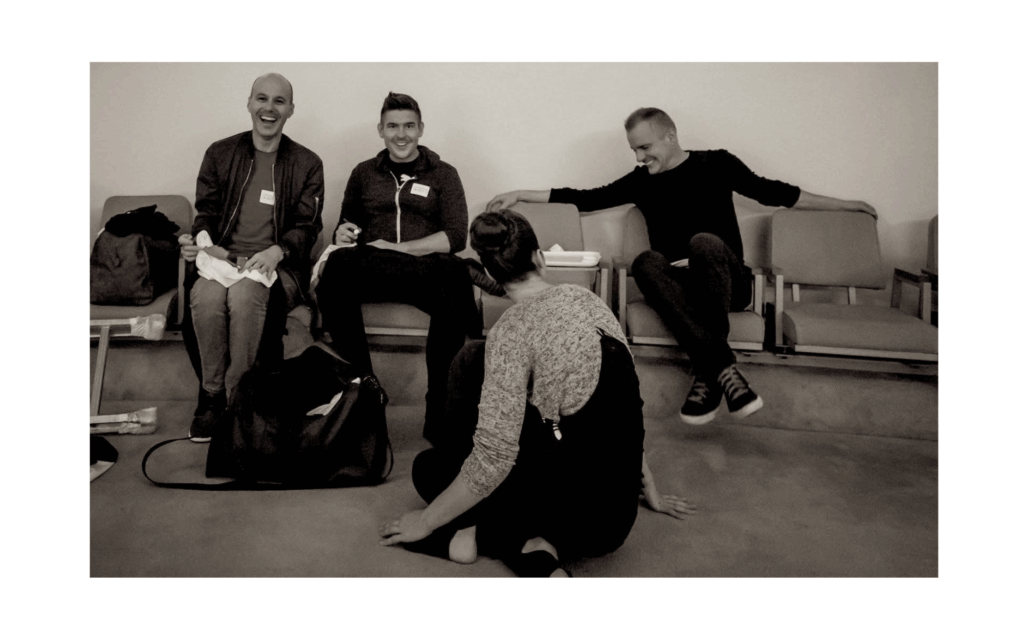
Michael says, “We have all wanted to quit at some point or another, but don’t. Don’t you dare give up.” He explains how important it is to surround yourself with good people you can trust and who can help support you as you work toward your goals.
He also offers practical advice. Michael says, “Keep a notebook. In it, write your future self a reminder why you selected this soundtrack, costume, set design, designer, etc. Refer back anytime you feel lost, don’t understand feedback, or are getting distracted.” Use yourself as your own guide.
Looking Toward the Future
Personally, after taking a short break from traveling and teaching, Michael is looking forward to diving back into teaching, judging, drill, and design for marching band, winter guard, and DCI consulting.
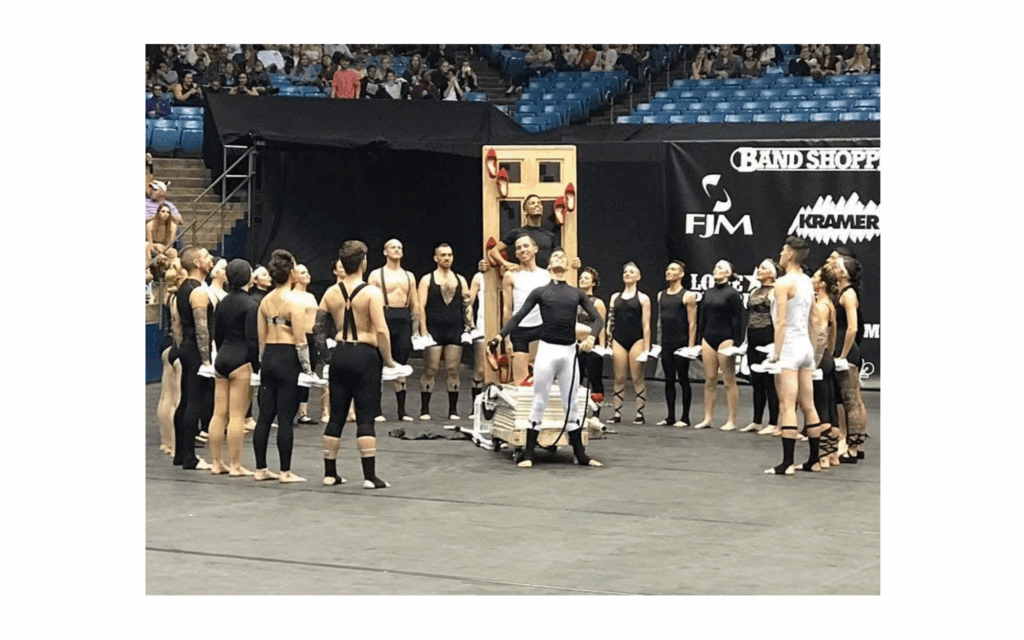
He is also looking forward to continuing to work with Onyx. Michael says, “Onyx is my happy place. Even though not every day is perfect, I view Onyx like a novel. Each year is a new chapter and a different offering to the activity.” He explains, “Onyx does provide a unique viewing experience, but the performers and staff also share in that experience, and my favorite part of every season is watching Onyx perform!” Of course, Onyx has competitive goals as well as being a 3-Time World Champion. Michael says, “We are working for #4 and, as always, we will do it by being the best version of ourselves.”
As for the future of WGI, Michael explains, “WGI has made huge strides over the past 2 decades in providing useful educational materials, creating professional media and publications, providing funding for adjudicator training and development, and delivering specific, user-friendly communication from the office and the division leaders.” He says, “This just scratches the surface of the things that WGI has done right! We have many opportunities available to us as performing organizations. As designers, we can and will continue to grow both creatively and in quality in 2025.”
Michael says, “In my ideal season, everyone works hard, has a great time doing it, creates new work, and delivers that work to an audience who celebrates it. I look forward to every season, and I still believe anything is possible. If I didn’t believe that, I wouldn’t still be in the marching arts 42 years later.”
































